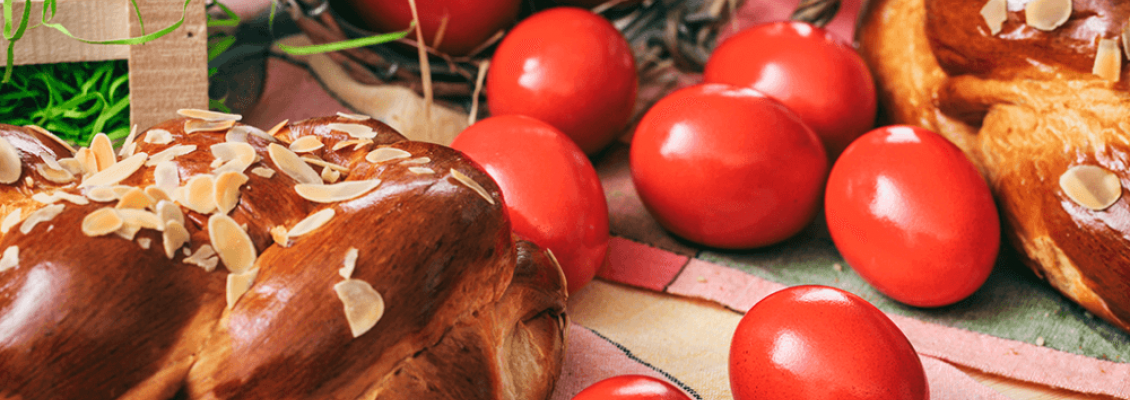
Το Πάσχα στην Ελλάδα - Παραδόσεις
Greek Easter Traditions
Greek Easter is the most important religious celebration in Greece, and
it’s full of meaningful customs that bring families and communities together.
As
Easter approaches, Greece comes alive with beautiful traditions full of color,
joy, and meaning. One of the most special customs is the red eggs (κόκκινα αυγά) —they symbolize life, renewal, and the blood of
Christ. On Easter Sunday, families play a fun game called tsougrisma -
τσούγκρισμα, where they crack their eggs against each other, and
the one whose egg doesn’t break is said to have good luck for the year!
Another sweet tradition is the Easter bread called -τσουρέκι- a
soft, slightly sweet bread often braided and decorated with red eggs. It's
delicious and full of festive spirit!
During Holy Week -Μεγάλη εβδομάδα-, you’ll see candlelit processions, hear beautiful
hymns, and smell traditional dishes being prepared, like lamb on the spit –
αρνί στη σούβλα-, which is the centerpiece of the Easter Sunday feast.
Greek Easter is a time of togetherness, joy, and celebrating life’s
renewal. Whether you're in Greece or just learning about the culture, it's a
beautiful celebration to experience!
Χριστός Ανέστη!
(Christ is Risen!)
The traditional Easter greeting to which people reply:
Αληθώς Ανέστη / Αληθώς ο Κύριος!
(Truly, He is Risen!)
Here's a quick guide to what we do during Holy Week
(Μεγάλη Εβδομάδα)
and on Easter Sunday:
Μεγάλη Εβδομάδα
(Holy Week)
- Μεγάλη Δευτέρα (Holy Monday)
The week begins with a focus on spiritual cleansing and preparation. Many people fast and attend church services. - Μεγάλη Τρίτη (Holy Tuesday)
In the evening, people go to church to hear the hymn of Κασσιανή, a beautiful and emotional chant. - Μεγάλη Τετάρτη (Holy Wednesday)
People receive Holy Unction (Ευχέλαιο) in church for healing and forgiveness. It's also a day for house cleaning! - Μεγάλη
Πέμπτη
(Holy Thursday)
- We dye eggs red to symbolize the blood of Christ and new
life.
- In church, we hear the 12 Gospels and remember the Passion
of Christ.
- Families bake tsoureki- τσουρέκι-, the
traditional Easter bread.
- Μεγάλη Παρασκευή (Holy Friday)
The most solemn day. - Churches are decorated with flowers and the Epitaphios – Επιτάφιος (a symbolic tomb of Christ) is
carried through the streets in a candlelit procession.
- Many people fast completely this day.
- Μεγάλο
Σάββατο (Holy Saturday)
- At midnight, people go to church with candles. When the priest
says "Χριστός Ανέστη" (Christ is Risen), everyone lights their candle with the Holy
Light and says: "Αληθώς Ανέστη!" (Truly, He is
Risen!)
- Fireworks (πυροτεχνήματα) light up the sky, and people go home to eat
the traditional magiritsa soup – μαγειρίτσα.
Η μαγειρίτσα
It is a
traditional Greek soup that is eaten right after the midnight church service on
Holy Saturday, to break the Lenten fast and celebrate the Resurrection.
It’s made
mainly with lamb offal (like liver and intestines), rice, fresh
herbs like dill and spring onions, and it’s finished with a creamy
egg-lemon sauce called avgolemono – αυγολέμονο.
Although it
may sound unusual to those unfamiliar with it, magiritsa is deeply
symbolic and comforting after the long period of fasting. It helps the body
gently return to eating meat after abstaining for so long.
It’s warm,
flavorful, and for many Greek families, Easter just wouldn’t feel complete
without it!
Κυριακή του Πάσχα
(Easter Sunday)
- A
day of celebration, joy, music, dancing, and food!
- Families
gather for a big meal, usually with lamb on the spit, -αρνί στη σούβλα-
salads, pies, and desserts.
- We
play the egg-cracking game (τσουγκρίζουμε αυγά) and enjoy being together after the days of fasting and prayer.
Other
Beautiful Easter Traditions
- The
Holy Fire (Το Άγιο Φως) : The
light that arrives from Jerusalem on Holy Saturday and is shared from
candle to candle.
- Lambada
(Λαμπάδα): Decorated candles given to children by their godparents to use at
the midnight Resurrection service.
- Fasting
(Νηστεία): Many people fast for 40 days, avoiding meat, dairy, and eggs to
prepare spiritually for Easter.
It’s a very special time in Greece, filled with
emotion, reflection, and celebration. Whether you experience it in person or
learn about it from afar, Greek Easter offers a deep connection to culture,
family, and tradition.
Χρόνια Πολλά και Καλό
Πάσχα!
(Happy Holidays and Happy
Easter!)
